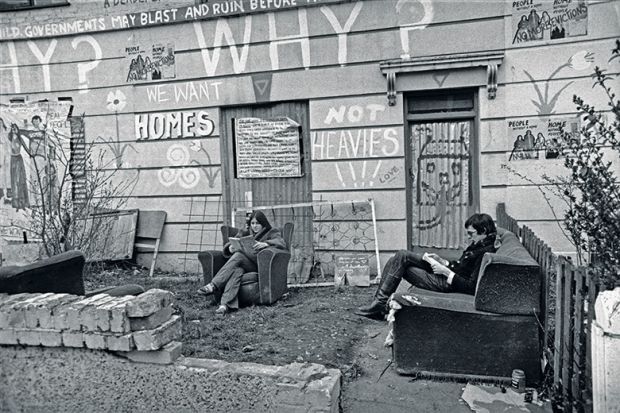Squatting has generally been a history off the grid. Motivated by desperation, political conviction or simply a love of unloved buildings, squatters young and old have moved in to occupy spaces abandoned, scheduled for demolition or marooned in failed schemes of redevelopment. We imagine squats with the power cut: camping behind boarded-up doors.
Yet squatting often looked nothing like this. Many new occupiers fashioned living conditions far superior to homes under the care of private landlords. They undid the work of wreckers, replacing floorboards and making the toilets flush again. And for all those cases where squatters’ actions pitted them against the local council, there were also instances where the authorities were on their side, licensing their occupancy and even providing grants to support their DIY efforts. Anarchists promoting squatting as a tactic won 11 per cent of the vote in Amsterdam’s council elections in 1970.
Alex Vasudevan tells the story of squatting as a phenomenon and as a movement in various locations across Europe and North America, focusing largely on the period from the 1960s to the present. He documents squatters’ pursuit of “autonomy”, from Puerto Ricans’ struggle to access affordable housing in New York’s Upper West Side in the 1970s to the occupation of the sometime headquarters of the Danish labour movement as a radical social centre, ended by a dramatic police operation in 2007. The fate of Copenhagen’s Ungdomshuset is just one of the more violent examples in a book full of evictions and legal proceedings. But there are stories of survival, too, and of legacies, for architectural preservation, the regeneration of urban districts and – as Vasudevan is keen to argue – different ways of thinking about community life.
The book stakes a claim for giving squatters a more prominent place in the history of the modern city – and in its future as well, suggesting that squatting shows “how we might still come to know and live the city differently”. The case studies, including New York, Amsterdam, Frankfurt, Berlin, London, northern Italy and Vancouver, set out to explore different themes, but common threads emerge. Indeed, the book often becomes a broader history of the struggle for decent housing. “Do it yourself!”, a Dutch Guide for Squatters instructed readers in 1969; “Take the solution of the housing problem into your own hands.”
Vasudevan’s squatters were renaissance radicals, demonstrating practical skills in plumbing and joinery, getting involved in legal battles, negotiating with local authorities, organising campaigns and happenings, and reimagining the city in the process. The research sketches a scene of alternative communities: communal kitchens, recycling schemes, printing presses, punk gigs and art exhibitions.
Some of these squats went legit, transformed into more conventional housing associations or acting as an advance guard for urban gentrification. In many cases, the spaces themselves have since been obliterated, with bulldozers providing the ultimate tool for owners and local officials committed to forcing evictions. Vasudevan insists that he is not interested in producing a romanticised account, but he approaches the topic with a sense of mission, arguing that it encourages reflections about community action, sustainable living, prioritising homes over property and alternative prospects for the neoliberal city. “There is, after all,” he writes, “still much to be learned from squatting.”
Clare Griffiths is professor of modern history, Cardiff University.
The Autonomous City: A History of Urban Squatting
By Alexander Vasudevan
Verso, 304pp, £60.00 and £16.99 (paperback)
ISBN 9781781687857, 7864 (paperback) and 7871 (e-book)
Published 4 April 2017
POSTSCRIPT:
Print headline: No money down; move in today
Register to continue
Why register?
- Registration is free and only takes a moment
- Once registered, you can read 3 articles a month
- Sign up for our newsletter
Subscribe
Or subscribe for unlimited access to:
- Unlimited access to news, views, insights & reviews
- Digital editions
- Digital access to THE’s university and college rankings analysis
Already registered or a current subscriber? Login
